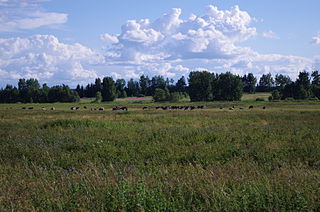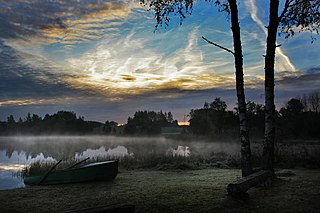Related Research Articles

Tallinn is the capital and most populous city of Estonia. Situated on a bay in north Estonia, on the shore of the Gulf of Finland of the Baltic Sea, Tallinn has a population of about 461,000 and administratively lies in the Harju maakond (county). Tallinn is the main governmental, financial, industrial, and cultural centre of Estonia. It is located 187 km (116 mi) northwest of the country's second largest city, Tartu; however, only 80 km (50 mi) south of Helsinki, Finland, also 320 km (200 mi) west of Saint Petersburg, Russia, 300 km (190 mi) north of Riga, Latvia, and 380 km (240 mi) east of Stockholm, Sweden. From the 13th century until the first half of the 20th century, Tallinn was known in most of the world by variants of its other historical name Reval.

Viljandi is a town and municipality in southern Estonia with a population of 17,407 in 2019. It is the capital of Viljandi County and is geographically located between two major Estonian cities, Pärnu and Tartu. The town was first mentioned in 1283, upon being granted its town charter by Wilhelm von Endorpe. The town became a member of the Hanseatic League at the beginning of the 14th century, and is one of five Estonian towns and cities in the league. The once influential Estonian newspaper Sakala was founded in Viljandi in 1878.

The Singing Revolution was a series of events from 1987 to 1991 that led to the restoration of independence of the three Soviet-occupied Baltic countries of Estonia, Latvia, and Lithuania at the end of the Cold War. The term was coined by an Estonian activist and artist, Heinz Valk, in an article published a week after the 10–11 June 1988 spontaneous mass evening singing demonstrations at the Tallinn Song Festival Grounds.
The recorded history of music in Estonia dates back as far as the 12th century.

Haapsalu is a seaside resort town located on the west coast of Estonia. It is the administrative centre of Lääne County, and on 1 January 2020 it had a population of 9,375.

Tartu County is one of 15 counties of Estonia.

Võru County is a county in southern Estonia. It is bordered by Valga and Põlva counties, Latvia's Alūksne and Ape municipalities, and Russia's Pskov Oblast.

Mart Sander is an Estonian singer, actor, director, author, artist, and television host.

Cinema of Estonia is the film industry of the Republic of Estonia. The motion pictures have won international awards and each year new Estonian films are seen at film festivals around the globe.

The Estonian Song Festival is one of the largest choral events in the world, a Masterpiece of the Oral and Intangible Heritage of Humanity. It is held every five years in July on the Tallinn Song Festival Grounds (Lauluväljak) simultaneously with the Estonian Dance Festival. The joint choir has comprised more than 30,000 singers performing to an audience of 80,000.

The culture of Estonia combines an indigenous heritage, represented by the country's Finnic national language Estonian, with Nordic and German cultural aspects. The culture of Estonia is considered to be significantly influenced by that of the Germanic-speaking world. Due to its history and geography, Estonia's culture has also been influenced by the traditions of other Finnic peoples in the adjacent areas, also the Baltic Germans, Balts, and Slavs, as well as by cultural developments in the former dominant powers, Sweden, Denmark and Russia. Traditionally, Estonia has been seen as an area of rivalry between western and eastern Europe on many levels. An example of this geopolitical legacy is an exceptional combination of multiple nationally recognized Christian traditions: Western Christianity and Eastern Christianity. The symbolism of the border or meeting of east and west in Estonia was well illustrated on the reverse side of the 5 krooni note. Like the mainstream cultures in the other Nordic countries, Estonian culture can be seen to build upon ascetic environmental realities and traditional livelihoods, a heritage of comparatively widespread egalitarianism arising out of practical reasons, and the ideals of closeness to nature and self-sufficiency.
Matsalu National Park is a nature reserve and national park situated in the Lääne and Pärnu counties of Estonia. Matsalu National Park spans an area of 486.1 km2 (187.7 sq mi), comprising Matsalu Bay, the Kasari River delta, the village of Matsalu and surrounding areas.

The Tallinn Song Festival Grounds are the grounds on which the Estonian Song Festival is held every five years.

The following is an alphabetical list of articles related to the Republic of Estonia.
Tallinn Black Nights Film Festival, or PÖFF, is an annual film festival held since 1997 in Tallinn, the capital city of Estonia. PÖFF is one of the largest film festivals in Northern Europe. In 2014 it was upgraded to an A-list festival by FIAPF.

Eesti Laul is an annual music competition organised by Estonian public broadcaster Eesti Rahvusringhääling (ERR). It determines the country's representative for the Eurovision Song Contest, and has been staged every year since 2009. Eesti Laul was introduced in 2009, replacing the former Eurolaul festival which had been used since Estonia's first Eurovision participation in 1993. It is one of the most popular television programmes in Estonia; it is also broadcast on radio and the Internet. In 2012, the semi-finals averaged 199,000 viewers, and over an estimated 296,000 viewers watched the final.

Estonian neopaganism, or the Estonian native faith, spans various contemporary revivals of the indigenous religion of the Estonian people, adapted from their local myths and culture.

Tangerines is a 2013 Estonian-Georgian film written, produced, and directed by Zaza Urushadze. Set during the 1992–1993 War in Abkhazia, the film is a morality tale addressing issues of conflict, reconciliation, and pacifism. It was filmed in Guria, Georgia.
The tradition of Estonian animation dates back to the 1930s when the first experimental films were made. The only surviving short film from the era is Kutsu-Juku seiklusi (1931). After the Great Depression, World War II, and Soviet Occupation interrupted its development, Estonian animation was reborn in 1958. Elbert Tuganov founded a puppet film division Nukufilm in Tallinnfilm Studio. The first film was titled Peetrikese unenägu based on a Danish writer Jens Sigsgaard's children story Palle alene i verden. Joonisfilm an 2D and 3D animation division of Tallinnfilm was founded by Rein Raamat in 1971. Films like Põld (1978), nominee for Golden Palm at the Cannes Film Festival in 1979; Lend (1973), the winner of Special Jury Award at the Zagreb World Festival of Animated Films; the Suur Tõll (1980), 2nd place at Ottawa International Animation Festival in 1982 and Põrgu (Hell) (1983), the winner of FIPRESCI Prize and Special Jury Award at the Annecy International Animated Film Festival made Raamat the first internationally recognized Estonian animation director.

Tallinn Music Week (TMW) is an international new music showcase, city culture festival and networking event for music and creative industry professionals, held every spring in Tallinn, Estonia since 2009. Operated by Tallinn-based company Shiftworks OÜ, it showcases emerging artists from all over Europe and beyond, provides a networking platform for music and creative industry professionals, and introduces the city of Tallinn. The festival is attended by around 20,000 people and 1,000 music industry executives yearly. TMW has been acknowledged as an important industry event and attractive tourism destination by The Guardian,New York Times, Forbes, and Experty.by.
References
- ↑ EE, Eesti entsüklopeedia. [Encyclopedia of Estonia] A-Ü. Tallinn: Valgus. 2003. p. 678. ISBN 9985701410.